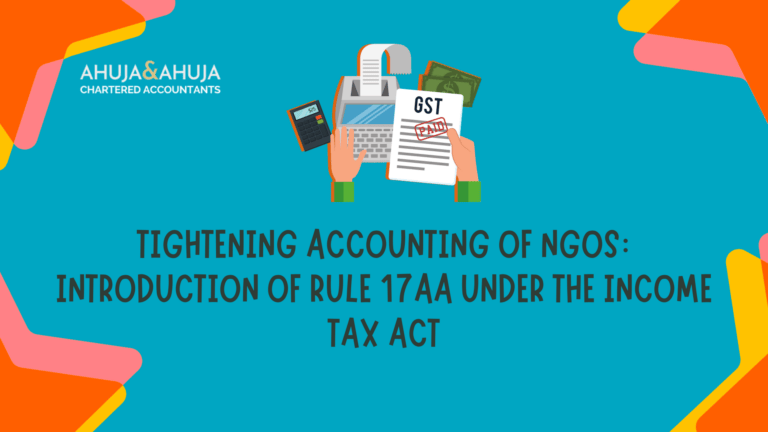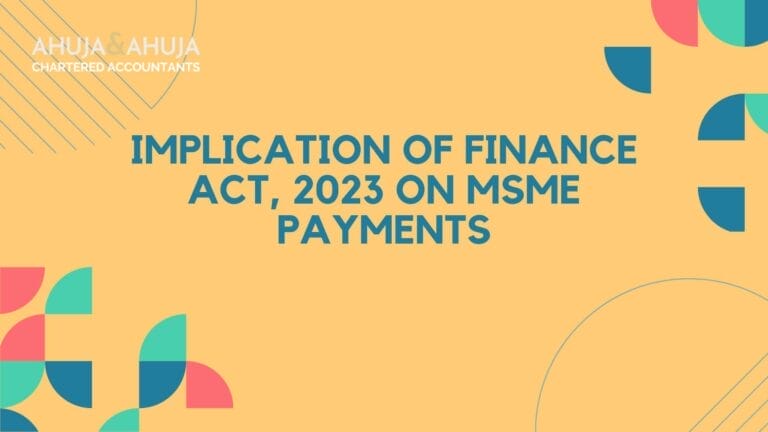Know All About Tax on Dividend Income
Dividends are a form of income derived from investments in shares of companies or mutual funds. For those investing in such financial instruments, understanding the tax implications of dividend income is crucial.
Dividend income was traditionally treated favorably under the Indian tax laws, with specific provisions to mitigate multiple layers of taxation.
However, recent legislative changes have shifted the responsibility of tax payment to the recipients of such income. Here we will explore these changes and clarify the taxation process for dividend income.
What is Dividend Income?
Dividend income refers to the earnings distributed by a company to its shareholders from its profits. For investors in stocks, unit-linked insurance plans (ULIPs), or mutual funds, dividends represent a return on their investment.
According to Section 2(22) of the Income-Tax Act, dividends also encompass:
- Distribution of accumulated profits, leading to the release of company assets.
- Issuance of debentures or deposit certificates from accumulated profits.
- Distributions during company liquidation derived from accumulated profits.
- Reduction of company capital involving accumulated profits distribution.
- Advances or loans by a closely held company to its shareholders from accumulated profits.
For a detailed exploration of dividend implications under special circumstances, such as minimum alternative tax scenarios, consider reading on MAT – Minimum Alternative Tax (Section 115JB).
Sources of Dividend Income
Dividend payment can be initiated from various sources. Here’s a look at the primary sources where investors may receive dividends:
- Domestic Companies: If you invest in shares of Indian companies, you may receive dividends out of the profits made by these companies.
- Foreign Companies: Investments in shares of companies based outside India can also yield dividends, but with different tax implications.
- Equity Mutual Funds: Opting for the dividend plan in equity mutual funds can provide periodic returns in the form of dividends.
- Debt Mutual Funds: Similar to equity funds, choosing a dividend option in debt mutual funds can also result in receiving dividend income.
These dividends, depending on their source, might be subject to different taxation rules, which we’ll discuss in the subsequent sections. It’s also crucial to understand various other implications linked to dividends, such as issues related to the buy-back of shares by a company.
Assessing Tax on Dividend Income: Old vs. New Provision
Historically, dividends received from Indian companies were exempted from tax in the hands of the shareholder up until March 31, 2020.
This exemption was due to the fact that the company distributing the dividends was subjected to Dividend Distribution Tax (DDT).
Following the introduction of the Finance Act 2020, such tax dynamics underwent significant restructuring.
Before April 1, 2020
- Dividends were exempt from income tax up to the assessment year 2020-21 under section 10(34), provided the dividend distribution tax (DDT) was paid by the distributing domestic company.
From April 1, 2020, Onwards
- The abolition of DDT shifted the tax liability directly to the receivers, making dividend income taxable at the applicable personal income tax rates.
This change necessitated a re-evaluation of how dividends are reported and taxed, affecting all stakeholders from individual investors to corporate entities engaging in statutory audit services.
This introductory section sets the stage by providing clarity on what dividend income involves, its sources, and the substantive changes in its taxation post-April 2020.
These details form the foundation necessary for understanding the applicable tax regulations and preparing accurately for tax obligations, potentially leveraging GST consultancy services for broader financial insights and compliance.
Deductions and Allowances for Dividend Income
When managing taxes on dividend income, it’s essential to distinguish between dividends received as an investor and as a trader, as this distinction significantly impacts the tax treatment.
Dividends as Business Income:
If shares are held primarily for trading purposes, dividends received are considered business income. This classification allows an individual to claim deductions for all related expenses incurred to earn dividend income.
These expenses can include collection charges, interest on loans for purchasing shares, and other related expenses.
Dividends as Income from Other Sources:
Conversely, if shares are held as an investment, dividend income is classified under the head “income from other sources.” For such income, specific deductions are limited. Notably, the Income Tax Act permits:
- A deduction for interest expenses incurred to earn the dividend income, capped at 20% of the total dividend income.
- No other expenses, such as commission or remuneration paid for the realization of the dividend, are deductible.
This distinction in deduction allowances underlines the importance of how dividends are classified based on the purpose of the shareholding.
Taxation Timing for Dividend Income
The timing of taxing dividend income is crucial for accurate tax planning and filing:
Final Dividend:
As per Section 8 of the Income Tax Act, final dividends are taxable in the year in which they are declared, distributed, or paid by the company, whichever occurs first.
Interim Dividend:
Interim dividends are taxable in the year the amount is made unconditionally available by the company to the shareholder. This is typically on a receipt basis, providing a different timeline for tax accountability compared to final dividends.
TDS on Dividend Income
Since April 1, 2020, dividend distributions by Indian companies have been subject to Tax Deducted at Source (TDS):
- Dividends Exceeding Rs. 5,000: Indian companies must deduct TDS at the rate of 10% on dividend payments to resident shareholders if the total dividend exceeds Rs. 5,000 in a financial year.
- Exceptions: TDS is not required on dividends paid to Life Insurance Corporation of India (LIC), General Insurance Corporation of India (GIC), and other insurers holding shares where they have full beneficial interest.
- Dividends to Non-Residents: Dividends payable to non-residents, including foreign companies, attract TDS under Section 195. This deduction is in accordance with the rates provided under the relevant Double Taxation Avoidance Agreement (DTAA).
These guidelines ensure that the appropriate taxes are withheld at source, reducing the burden of lump-sum tax payments at the year-end by the shareholder.
Advanced Tax and Dividend Income
Dividend income can significantly impact an investor’s tax calculations, particularly when it comes to advance tax payments. Under the Income Tax Act:
- Investors are required to pay advance tax in four installments if their tax liability exceeds Rs. 10,000 in a financial year.
- The receipt of dividend income might cause a spike in tax liability if not anticipated and factored into the advance tax calculations.
- If an investor fails to account for dividend income, resulting in a shortfall of advance tax, interest under section 234C may be levied. However, if the shortfall is solely due to underestimation of dividend income, and the tax deficit is rectified in subsequent advance tax installments, the interest penalty might be waived.
This provision encourages taxpayers to diligently update their tax estimates through the year as dividend incomes are received, to remain compliant and avoid penalties.
Double Taxation Relief for Foreign Dividends
Investors receiving dividends from foreign entities face potential double taxation—where the same income is taxed both in the source country and the resident country. To alleviate such issues:
- Double Tax Avoidance Agreements (DTAA): India has entered into DTAAs with multiple countries, which provide relief by allocating taxing rights or offering credits for taxes paid overseas.
- Section 91: For countries with which India does not have a DTAA, relief under Section 91 allows a unilateral relief for taxes paid abroad, alleviating double taxation concerns.
Knowledge of these agreements and provisions is crucial for investors in international markets to manage and mitigate their tax liabilities effectively.
Inter-corporate Dividend Tax Adjustment
From the Assessment Year 2020-21 onwards, to avoid the cascading effect of taxes on inter-corporate dividends, a new provision was introduced:
- Section 80M: It allows a domestic company to claim a deduction for the amount of dividend distributed, provided such distribution is made one month prior to the due date of filing of return, thereby mitigating the burden of double taxation on dividends within a corporate group.
- Foreign Dividends: However, for dividends received from foreign companies, the tax scenario is different.
- If a domestic company holds at least 26% of equity in a foreign company, the dividend income is taxed at a concessional rate of 15%, plus applicable surcharge and cess, without any deduction for expenses.
- For lower shareholdings, the dividends are taxed at regular rates but allow deductions for expenses incurred to earn that income.
Understanding these provisions helps companies manage their tax liabilities on dividends received and further distributed, effectively reducing the overall tax burden.
Conclusion
Understanding the taxation of dividend income is essential for both individual investors and corporate entities.
With the shift from the Dividend Distribution Tax regime to taxing dividends in the hands of investors, it’s crucial to understand the deductions allowed, the timing of tax, TDS implications, and the available relief from double taxation.
By navigating these aspects effectively, taxpayers can optimize their tax positions and comply with the regulations effectively.
Frequently Asked Questions (FAQ)
What is the frequency of dividend payments?
Dividends can be paid daily, monthly, quarterly, half-yearly, or annually depending on the company or mutual fund house’s policy.
Do I need to pay tax on dividends?
Post-Finance Act 2020, dividends are taxable in the hands of the shareholders at their applicable income tax rates.
Are dividends considered income?
Yes, under the Income Tax Act, dividends are classified as income and are subject to taxation.
What does DDT mean?
DDT stands for Dividend Distribution Tax, which was a tax levied on the dividends paid by companies on the dividend distributed to its shareholders. Post-2020, this tax was abolished.
What is the full form of DDT in the tax context?
The full form of DDT is Dividend Distribution Tax.
By staying informed and seeking appropriate advice, such as consulting experienced providers of GST consultancy services, investors can navigate the complexities of dividend taxation efficiently and effectively.
Disclaimer
The materials provided herein are solely for educational and informational purposes. No attorney/professional-client relationship is created when you access or use the site or the materials. The information presented on this site does not constitute legal or professional advice and should not be relied upon for such purposes or used as a substitute for professional or legal advice.






